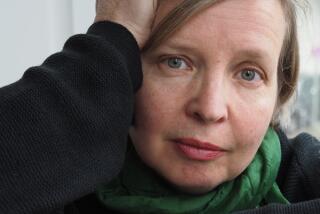The Impotence of Intelligence
- Share via
Impotence has never looked so good. It has rarely waxed so lyrical, nor built sentences of such tumbling, feverish intensity. Only now translated from the German, Wolfgang Koeppen’s 1953 novel, “The Hothouse,” is a prose poem about failure. Withering in its insights into post-World War II Germany, incantatory in its rhythms, it shows us the idealistic parliament member Keetenheuve, and it shows us how he perishes. It shows us good intentions that “turn awry and lose the name of action.” It brings us face to face with a modern-day Hamlet.
Koeppen himself was a Hamlet in his own time--full of promise, procrastination, ideals and indecision. An opponent of the Nazis, he left Germany in the company of a Jewish publisher in 1933--only to return in 1939 and spend the war neither resisting nor assisting, but working (like Hamlet) on scripts--unfinished scripts in the Berlin film industry. He burst briefly into the public eye with a trilogy of novels (among them “The Hothouse”) published between 1951 and ’54. After that, he lived another 42 years and never wrote another--though he never quit talking about his works in progress. “Do you have writer’s block, Mr. Koeppen?” asked interviewers. Why no, “I write all the time,” he retorted, and indeed he named plots and characters to prove it. Admirers like Gnter Grass and the well-known critic Marcel Reich-Ranicki speculated that the reason for his literary silence was the fury initially unleashed by his trilogy, which criticized postwar Germany in a way that even the then-self-critical Germans could not stand: Rather than attack the Nazis, it attacked the hypocrisy of their sanctimonious followers--the elite of Reconstruction Germany. People did not change, Koeppen wrote in “The Hothouse,” merely “because the uniforms thronging the streets and making babies were now olive-green instead of brown, black, and field-grey.” In 1953, police could not assure Koeppen’s safety at readings in Bonn, so they were canceled.
But if public outrage quieted Koeppen for a time, public admiration struck him dumb for good. After he received the Bchner Prize in 1962, interest in him revived, publishers put him on payrolls, and reporters hankered for his next novel. Koeppen announced, embellished, but never delivered.
The clue, perhaps, lies in Keetenheuve. When we first meet him, he is apparently fleeing the scene of a crime: He has murdered his wife’s murderer. Except, he hasn’t. “It probably wasn’t in him to commit murder.... Fantasies of murder coursed like flows of energy through his mind, ...and for a brief moment he had the feeling that ... he would break through to the world of action and make something of his life--but unfortunately his crime had been purely imaginary.” Though full of brave designs, Keetenheuve is ultimately “capable neither of love nor hate.” Like Hamlet, who can neither save Ophelia nor kill the king, Keetenheuve can neither save his wife, who succumbs to loneliness, lesbian lovers and spiked drinks as he skitters around the country as “a foolish knight crusading against power”; nor can he kill her killer after her death. For both these actions, his emotions--if not his intentions--prove inadequate.
In political and social life his success is no better; he expends himself in the rejection of his colleagues, in the discerning portrait of their vanities and failures; but has little energy to do things better himself. Contemplating the Rhineland, the site of Germany’s new Bonn-based government, he declares it an expensive, airless prison: “A hothouse climate flourished in the basin between the hills; the air stagnated.... Villas stood beside the water, roses were bred, prosperity strode through the parkland wielding hedge clippers, gravel crunched crisply under the pensioners’ lightweight footwear. Keetenheuve would never join their ranks.”
Perhaps not, but what ranks would he join? He wants to be an enfant terrible , a mover and shaker; he wishes to release a storm in the protected greenhouse that is Germany. Indeed, “if we have a sprinkler system in the chamber,” he intones during a session of parliament, “someone should switch it on, we need a downpour.” But his speech is no downpour. It rouses nobody. The delegates yawn and remain in their roles: “[I]t had just been a piece of theater; now they could go take off their make-up.”
Koeppen’s novel is a chastening anatomy of politics--not only German, but global. It is a portrait of the weakness of good intentions, the impotence of intelligence. When Hamlet went down, at least he took some bad guys down with him. When his 20th century descendant goes, he takes no one.
If Koeppen wrote no more novels after his trilogy, perhaps it is in part for the reason that an old reporter in “The Hothouse” writes no autobiography: He thinks too ill of mankind; he has seen too much. “The world,” says Koeppen, “was now waiting for his memoirs, but it was his present to the world that he was not writing them.”
More to Read
Sign up for our Book Club newsletter
Get the latest news, events and more from the Los Angeles Times Book Club, and help us get L.A. reading and talking.
You may occasionally receive promotional content from the Los Angeles Times.










